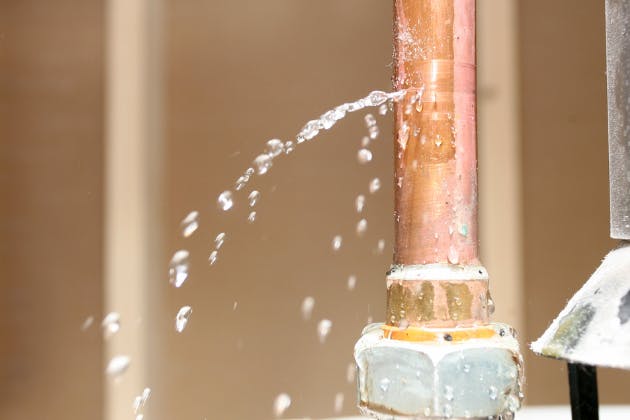A leaky boiler is a major problem needing quick care. Not only may it cause water damage in your house, but it could also point to underlying issues affecting the safety and efficiency of your heating system. Our plumbers in Romford, Dagenham and Hornchurch explore the main causes of boiler leaks, their identification techniques, and the actions you can take to solve the issue.
7 Common Causes of a Leaking Boiler and How To Fix Them
1. Corrosion
Over time, the internal components of your boiler, particularly pipes and joints, can deteriorate due to chemical reactions with water and oxygen. As corrosion progresses, it weakens the metal, leading to small cracks or holes that allow the water to pass through.
To prevent corrosion:
- Install a water softener to reduce mineral content
- Regularly flush the system to remove sediment buildup
- Consider using corrosion inhibitors in the boiler water
2. High Boiler Pressure
Excessive pressure within the boiler system can force water through weak points, causing leaks. This often manifests as water escaping from the pressure relief valve, which is designed to release pressure when it exceeds safe levels. Normal boiler pressure typically ranges between 1.0 and 1.5 bar when cold.
To address high pressure:
- Check the pressure gauge regularly
- Bleed radiators to release trapped air
- Ensure the filling loop is fully closed
- If pressure consistently rises, have a professional inspect the expansion vessel
3. Faulty Installation
Improper installation can lead to immediate or delayed leaks. Common installation errors include:
- Incorrect pipe fittings
- Over-tightened connections
- Misaligned components
- Use of substandard materials
Always use a Gas Safe registered engineer for boiler installation and repairs to prevent these issues.
4. Faulty Heat Exchanger
The heat exchanger is a crucial component that transfers heat from the burning fuel to the water. Cracks in the heat exchanger can allow water to leak, even when the boiler is not in use. Signs of a faulty heat exchanger include:
- Visible cracks or corrosion
- Abnormal noises
- Fluctuating water temperature
- Carbon monoxide alarms sounding
A faulty heat exchanger often requires full replacement, which should be done by a qualified professional.
5. Loose or Corroded Joints and Pipe Connections
Over time, vibrations and temperature fluctuations can cause joints and connections to loosen. Additionally, these areas are prone to corrosion due to constant exposure to water and varying temperatures. Inspect visible pipes and joints regularly for signs of wear or moisture.
To fix loose connections:
- Tighten accessible fittings with appropriate tools
- Replace corroded sections of piping
- Apply thread sealant to threaded connections
6. High Temperature Issues
A malfunctioning temperature control valve can lead to overheating, causing expansion and potential leaks. Symptoms of high temperature issues include:
- Excessively hot radiators or taps
- Steam or hissing sounds from the boiler
- Frequent activation of the pressure relief valve
To resolve high temperature problems:
- Check and adjust the boiler's temperature settings
- Ensure the thermostat is functioning correctly
- Have a professional inspect the temperature control valve
7. Wear and Tear
Regular use inevitably leads to component degradation. Seals, gaskets, and valves are particularly susceptible to wear. Preventative maintenance is crucial to mitigate the effects of wear and tear:
- Schedule annual boiler services
- Replace worn components proactively
- Keep the boiler area clean and dry to reduce environmental stress
Frequently Asked Questions
Can I still use my boiler if it's leaking?
No, it's unsafe to use a leaking boiler. Immediately turn off the water supply and central heating system. Place containers under the leak points to collect water and dry any spills. If you suspect a gas leak, shut off the gas supply immediately and contact a Gas Safe registered engineer.
Why is my boiler leaking water from underneath?
Leaks from the boiler's base typically indicate serious issues such as pressure problems, loose connections, or internal cracks. Common causes include a faulty pump seal, damaged heat exchanger, or corroded pipework. Professional diagnosis is crucial for accurate identification and repair.
What are the primary causes of boiler leaks?
The main causes include corrosion of internal components, wear and tear over time, excessive boiler pressure, faulty heat exchangers, loose pipe connections, and temperature control issues. Regular maintenance can prevent many of these problems.
How do I identify a gas leak from my boiler?
Signs of a gas leak include a distinct sulphuric odour, black stains around the boiler, excessive condensation on windows, and a pilot light that's orange or yellow instead of blue. If you suspect a gas leak, evacuate immediately and call the National Gas Emergency Service on 0800 111 999.
Is it advisable to attempt DIY repairs on a leaking boiler?
While minor issues like tightening loose connections might be manageable, most boiler repairs require professional expertise. Incorrect DIY attempts can void warranties, cause further damage, or create safety hazards. Always consult a Gas Safe registered engineer for boiler repairs.
How often should I have my boiler serviced to prevent leaks?
Annual servicing by a qualified engineer is recommended. This helps identify potential issues before they escalate, ensures efficient operation, and maintains manufacturer warranties. Regular maintenance significantly reduces the risk of unexpected leaks and breakdowns.


